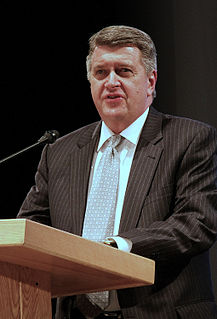A Quote by J. I. Packer
Revelation does not mean man finding God, but God finding man, God sharing His secrets with us, God showing us Himself. In revelation, God is the agent as well as the object.
Related Quotes
Disguise is central to God's way of dealing with us human beings. Not because God is playing games with us but because the God who is beyond our knowing makes himself known in the disguise of what we can know. The Christian word for this is revelation, and the ultimate revelation came by incarnation. ... God is the master of disguises, in order that we might see.
When religion has said its last word, there is little that we need other than God Himself. The evil habit of seeking God-and effectively prevents us from finding God in full revelation. In the and lies our great woe. If we omit the and we shall soon find God, and in Him we shall find that for which we have all our lives been secretly longing.
There are two gods. The god our teachers teach us about, and the God who teaches us. The god about whom people usually talk, and the God who talks to us. The god we learn to fear, and the God who speaks to us of mercy. The god who is somewhere up on high, and the God who is here in our daily lives. The god who demands punishment, and the God who forgives us our trespasses. The god who threatens us with the torments of Hell, and the God who shows us the true path.
There are two gods. A god who casts us off because of our sins, and a God who calls to us with His love.
By His gracious condescension God became man and is called man for the sake of man and by exchanging His condition for ours revealed the power that elevates man to God through his love for God and brings God down to man because of His love for man. By this blessed inversion, man is made God by divinization and God is made man by hominization. For the Word of God and God wills always and in all things to accomplish the mystery of His embodiment.
God has spoken to man, and the Bible is his Word, given to us to make us wise unto salvation... Godliness means responding to God's revelation in trust and obedience, faith and worship, prayer and praise, submission and service. Life must be seen and lived in the light of God's Word. This, and nothing else, is true religion.
Man depends on God for all things: God depends on man for one. Without man's love God does not exist as God, only as creator, and love is the one thing no one, not even God himself, can command. It is a free gift or it is nothing. And it is most itself, most free, when it is offered in spite of suffering, of injustice, and of death . . . The justification of the injustice of the universe is not our blind acceptance of God's inexplicable will, nor our trust in God's love, his dark and incomprehensible love, for us, but our human love, notwithstanding anything, for him.
The difference between the truth of God and revelation is very simple. Truth is where God's been. Revelation is where God is. Truth is God's tracks. It's His trail, His path, but it leads to what? It leads to Him. Perhaps the masses of people are happy to know where God's been, but true God chasers are not content just to study God's trail, His truths; they want to know Him. They want to know where He is and what He's doing right now.
Worship ought not to be construed in a utilitarian way. Its purpose is not to gain numbers nor for our church to be seen as successful. Rather, the entire reason for our worship is that God deserves it. (Worship) immerses us in the regal splendor of the King of the cosmos…provides opportunities for us to enjoy God’s presence in corporate ways that takes us out of time and into the eternal purposes of God’s kingdom. As a result, we shall be changed—but not because of anything we do. God, on whom we are centered and to whom we submit, will transform us by his Revelation of himself.
Don't neglect your critical faculties. Remember that God is a rational God, who has made us in His own image. God invites and expects us to explore His double revelation, in nature and Scripture, with the minds He has given us, and to go on in the development of a Christian mind to apply His marvellous revealed truth to every aspect of the modern and post-modern world.
The gospel is saying that, what man cannot do in order to be accepted with God, this God Himself has done for us in the person of Jesus Christ. To be acceptable to God we must present to God a life of perfect and unceasing obedience to his will. The gospel declares that Jesus has done this for us. For God to be righteous he must deal with our sin. This also he has done for us in Jesus. The holy law of God was lived out perfectly for us by Christ, and its penalty was paid perfectly for us by Christ. The living and dying of Christ for us, and this alone is the basis of our acceptance with God
The law of giving and receiving is fundamental, and relates just as much to God as it does to us. As we go through the door of giving ourselves to God in worship we find that God comes through that same door and gives Himself to us. God's insistence that we worship Him is not really a demand at all but an offer-an offer to share Himself with us. When God asks us to worship Him, He is asking us to fulfill the deepest longing in Himself, which is His passionate desire to give Himself to us. It is what Martin Luther called "the joyful exchange."



































